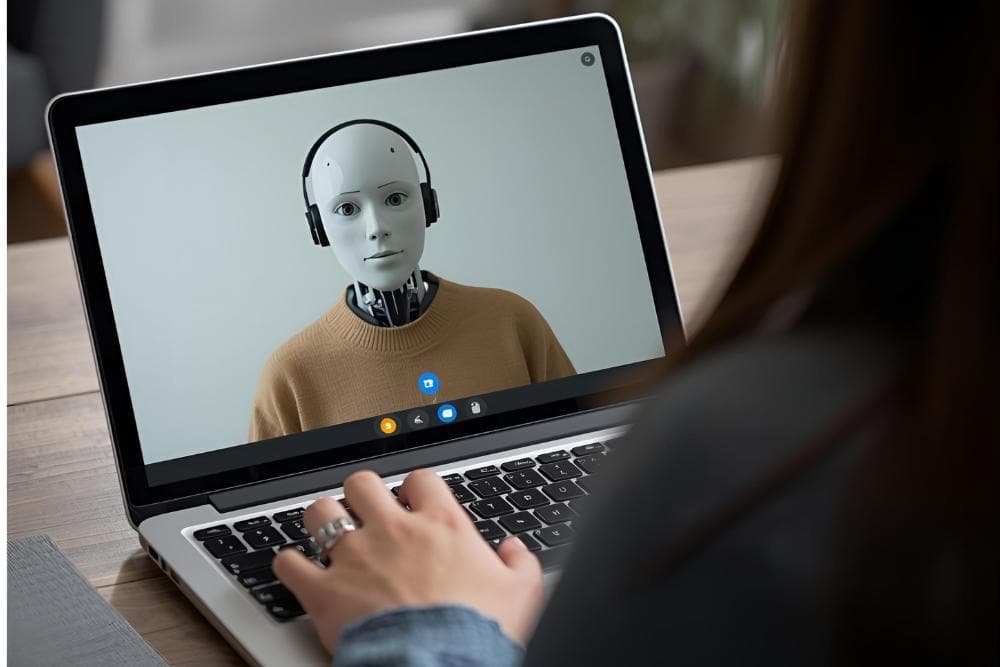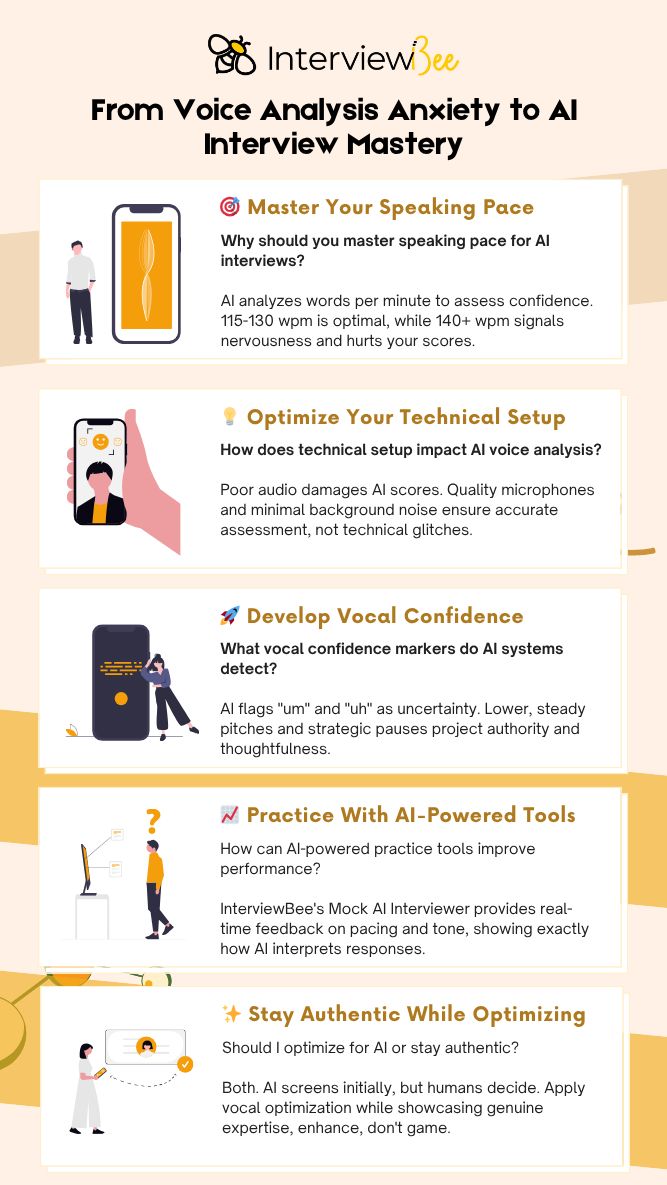
AI Interview Preparation 2025: Beat Voice Analysis AI
- Author: Anindita Ghosh
- Published On: Oct 08, 2025
- Category:Interview Guide
The job interview landscape has fundamentally changed. In 2025, artificial intelligence isn't just scheduling your interviews, it's listening to every word you say, analyzing your tone, and scoring your vocal patterns to determine if you're hire-worthy. With the AI interview software market exploding to $1.2 billion and 67% of Fortune 500 companies now using voice analysis technology, mastering AI interview preparation has become a critical skill for career success.
What Is Voice Analysis AI and Why Do Companies Use It
Voice analysis AI examines far more than your words during interviews. These sophisticated systems measure vocal biomarkers, including pitch variations, speaking pace, pause patterns, and even micro-tremors in your voice to assess confidence, communication skills, and cultural fit.
Major companies have already embraced this technology. Unilever processes over 250,000 applications annually using AI-powered platforms, reducing their hiring time by 75% while increasing diversity hires by 16%. Companies like Intuit, Goldman Sachs, and HSBC rely on platforms like HireVue for screening candidates through automated voice and video assessments.
The appeal for employers is clear: faster screening, standardized evaluations, and the ability to process thousands of applications without human bias. However, this creates a new challenge for job seekers who must now optimize their vocal delivery for algorithmic assessment.
How AI Evaluates Your Voice During Interviews
When you participate in a one-way video interview, AI systems analyze multiple dimensions simultaneously:
Speaking Pace: Research shows that 115-130 words per minute is optimal for interview settings. Speaking faster than 140 wpm often signals nervousness and can negatively impact your scores. Too slow, and you may appear uncertain or unprepared.
Vocal Confidence: AI measures voice steadiness, pitch stability, and assertion patterns. Lower, steadier pitches are perceived as more authoritative, while excessive pitch variation might be interpreted as stress or lack of confidence.
Clarity and Articulation: Systems assess how clearly you pronounce words and structure responses. Unfortunately, this can disadvantage non-native English speakers or candidates with regional accents, as AI models are typically trained on standard American or British English patterns.
Confidence Scoring: Advanced platforms generate numerical confidence scores for each response, though research reveals significant limitations in these measurements, with voice stress analysis performing no better than 50% accuracy in many studies.
The Candidate Experience: Navigating AI Video Interviews
In case you have experienced one way video interviewing sites, you are in the ranks of millions of people operating in a progressively automated hiring system. In these asynchronous interviews, the applicant is to answer standardized questions under severe time constraints, and there is no human contact. The AI assesses your voice, speech patterns and message before any recruiter opens your application.
The screening process with AI presents great challenges to the candidate. Studies indicate that 66% of job applicants complain that they have been ghosted by AI systems and have minimal or no feedback on their automated interviews. Also, 62 percent of applicants indicate that they would not work in companies that base their recruiting activities on AI heavily, because they think the system is unfair and neutral.
The technical needs are also a hindrance to success. Most of the candidates feel difficulties in maximizing their audio-visual configuration, talking in the natural manner to the camera and being nervous because they realize that this time, an algorithm is evaluating every hesitation and tonal variance. Facial analysis is no longer a feature of platforms such as HireVue, and the company announced this in 2021, but the company is still under fire due to voice analysis.
The lack of connection between the excitement of the employer and the response of the candidate is emphatic: 84% of job applicants currently refuse the use of AI-based interviews, and three out of every five adults are against the idea of using AI to make final decisions on hiring. The reasons behind this resistance are the fear of algorithmic bias, the inability to have transparency in the scoring systems, and the fact that in the initial screening phases, no one is involved in the screening process.
Practical AI Interview Preparation Strategies
Understanding how AI evaluates your voice is only half the battle. The real challenge lies in translating this knowledge into actionable preparation techniques that help you perform confidently during actual interviews. Here are five evidence-based strategies to optimize your AI interview readiness:
1. Master Your Speaking Pace
Practice with speech-to-text tools to monitor your natural rate. Record yourself answering common interview questions and adjust to the 115-130 wpm sweet spot. [InterviewBee's Mock AI Interviewer](https://interviewbee.ai/mock-ai-interviewer) provides real-time feedback on your pacing during practice sessions.
2. Optimize Your Technical Setupe
Audio quality directly impacts AI analysis accuracy. Invest in a quality external microphone, minimize background noise, and ensure stable internet connectivity. Test your setup in the actual interview environment beforehand.
3. Develop Vocal Confidence
Work on clear articulation and purposeful pausing. Avoid filler words like "um" or "uh" that AI flags as uncertainty markers. Use strategic pauses for emphasis rather than allowing nervous silence.
4. Practice With AI-Powered Tools
The best AI interview preparation involves experiencing AI evaluation firsthand. Platforms like InterviewBee's Mock AI Assistant help you understand how AI interprets your responses and provides proper responses based on your resume and job description.
5. Stay Authentic
While optimizing for AI is important, remember that human recruiters make final decisions at most companies. Focus on authentic communication that showcases your genuine expertise and passion rather than trying to "game" the system.
AI Voice Interviews in the Future.
The voice analysis market will keep growing with the forecasts of up to 3.68 trillion in the year 2034. The most recent tendencies are the introduction of emotional AI, real-time coaching during interviews, and multimodal testing, which is the combination of voice, text, and problem-solving tests.
Nevertheless, government is becoming more regulated. GDPR categorizes voice data as potentially sensitive biometric data that requires express consent, and the U.S. states are enacting more strict AI hiring tools requirements. Probably in the future, there will be transparency requirements and bias testing requirements.
Conclusion
Voice analysis AI is the future of job recruitment in 2025. To succeed, one has to know the limitations and capabilities of the technology. With perfect pace and technical implementation, and training with the help of AI-driven tools, you could overcome these interviews with ease and stay true to yourself.
Hiring is not going to be replaced by algorithms, but it will be a matter of efficiency with human empathy through AI. When you are getting ready to do the next interview, it is worth remembering that as much as the AI is examining your tone, your real knowledge, interest, and human interaction will make you successful.
Ready to master AI interviews? Start practicing with InterviewBee's free AI mock interviewer and experience how voice analysis technology evaluates your responses in real-time.



